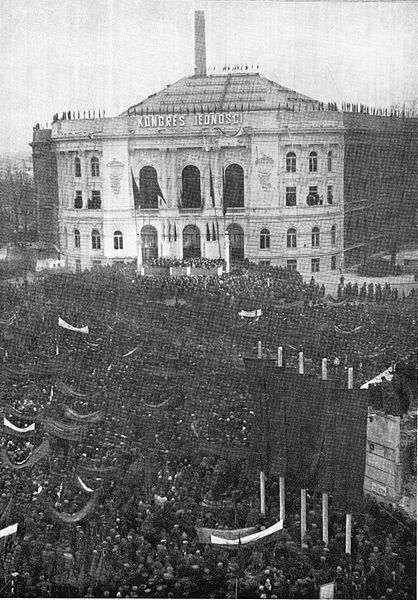Polish United Workers' Party
The Polish United Workers' Party, commonly abbreviated to PZPR, was the communist party which ruled the Polish People's Republic as a one-party state from 1948 to 1989. The PZPR had led two other legally permitted subordinate minor parties together as the Front of National Unity and later Patriotic Movement for National Rebirth. Ideologically, it was based on the theories of Marxism-Leninism, with a strong emphasis on left-wing nationalism. The Polish United Workers' Party had total control over public institutions in the country as well as the Polish People's Army, the UB and SB security agencies, the Citizens' Militia (MO) police force and the media.
Statute of the Polish United Workers' Party, 1956 edition
Crowds gathered in front of the main building of Warsaw University of Technology for the Unification Congress of the Polish Workers' Party and Polish Socialist Party (15 to 21 December 1948)
Władysław Gomułka, at the height of his popularity, on 24 October 1956, addressing hundreds of thousands of people in Warsaw, asked for an end to demonstrations and a return to work. "United with the working class and the nation", he concluded, "the Party will lead Poland along a new way of socialism".
First Secretary of PZPR Edward Gierek (left) with Speaker of the House of Representatives Carl Albert (right), Washington D.C., 1974
The Polish People's Republic was a country in Central Europe that existed from 1947 to 1989 as the predecessor of the modern-day Republic of Poland. From 1947 to 1952 it was known as the Republic of Poland, and it was also often simply known as Poland. With a population of approximately 37.9 million near the end of its existence, it was the second most-populous communist and Eastern Bloc country in Europe. A unitary state with a Marxist–Leninist government, it was also one of the main signatories of the Warsaw Pact alliance. The largest city and official capital since 1947 was Warsaw, followed by the industrial city of Łódź and cultural city of Kraków. The country was bordered by the Baltic Sea to the north, the Soviet Union to the east, Czechoslovakia to the south, and East Germany to the west.

Poland's fate was heavily discussed at the Yalta Conference in February 1945. Joseph Stalin, whose Red Army occupied the entire country, presented several alternatives which granted Poland industrialized territories in the west whilst the Red Army simultaneously permanently annexed Polish territories in the east, resulting in Poland losing over 20% of its pre-war borders. Stalin then imposed upon Poland a puppet communist government following the war, forcibly bringing the nation into the
A propaganda poster enhancing to vote for Communist policies in the "Three Times Yes" 1946 referendum
Draft of Constitution of the Polish People's Republic (Russian version) with Stalin's remarks, 1952
The 1970 Polish protests were put down by the communist authorities and Milicja Obywatelska. The riots resulted in the deaths of 42 people and over 1,000 injured.








